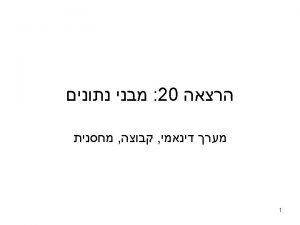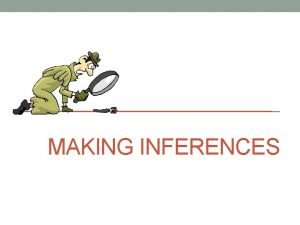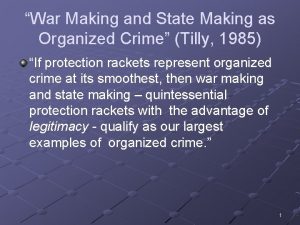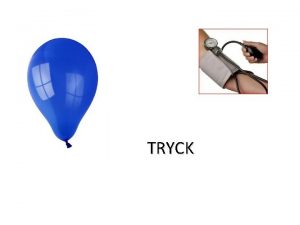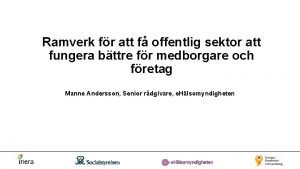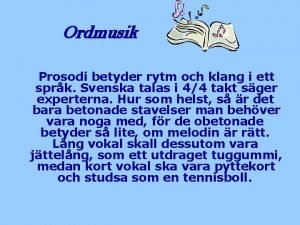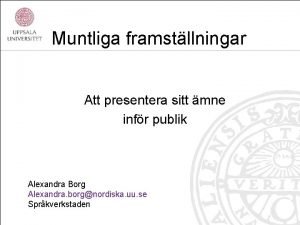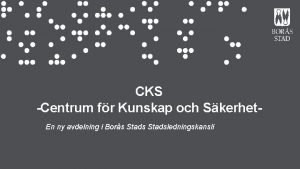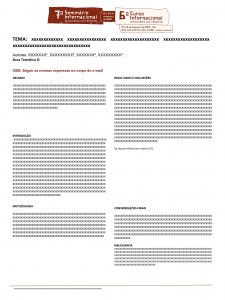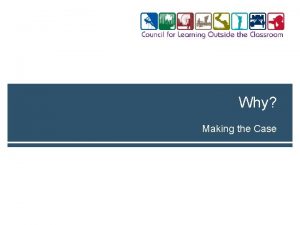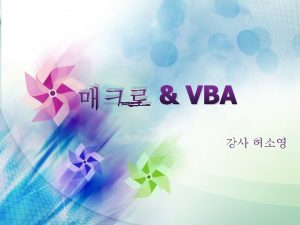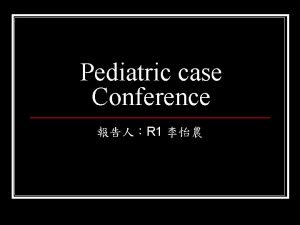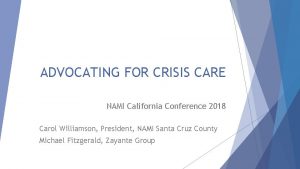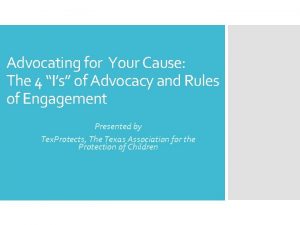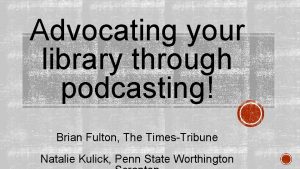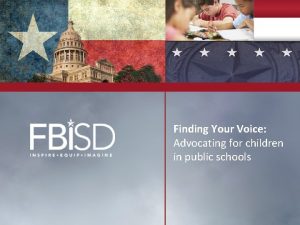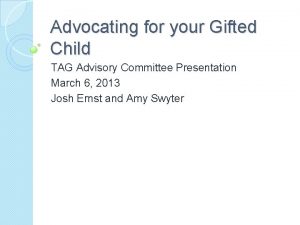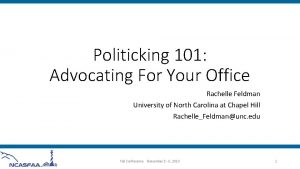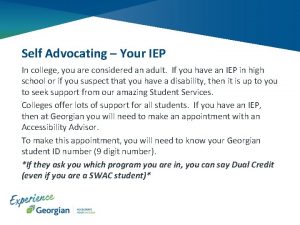Making the case Xxxxxxx Conference Advocating for your

































- Slides: 33

Making the case Xxxxxxx Conference Advocating for your theatre program In the COVID-19 era Part I

Making the case What we believe Theatre education matters to our students more than ever

Making the case What we believe Not WHAT but HOW– whether through inperson, hybrid or virtual instruction, student learning goals in theatre remain the same

Making the case What we know Theatre supports the social & emotional well -being of students

Making the case What we know Theatre creates a safe and nurturing space within the school environment

Making the case Theatre students Theatre is part of the well-rounded education for all students as defined by federal law

Making the case The data says that theatre students ü Critically think and problemsolve artistic, academic, and life challenges in both conventional and unconventional ways. ü Communicate in a variety of playmaking contexts to convey their own ideas and to interpret the ideas of others.

Making the case The data says that theatre students ü Collaborate to cultivate diverse ideas, solutions, and common goals, both onstage and backstage. ü Create personally meaningful theatrical stories generated from a range of sources and ideas.

Making the case The data says that theatre students ü Innovate and investigate through different approaches to traditional ideas to create new understanding. ü Evaluate information to reflect on its personal and artistic value. ü Adapt to changing circumstances in a variety of artistic and personal situations.

Making the case The data says that theatre students ü Self-direct to manage their own learning goals and improve as theatrical artists. ü Empathize with peers to build respectful and effective socially and culturally diverse teams working towards a common goal. ü Lead to build trust, demonstrate integrity, and inspire others to model ethical behavior that benefits their school and broader community.

Making the case The research says ü 97% of school administrators believe that theatre experiences help increase students’ understanding of the world. 2012 Ed. TA-Utah State University Survey of Theatre Education Programs in U. S. High Schools

Making the case The research says üHigh poverty students with sustained involvement in theatre show substantial improvement in reading proficiency, gains in selfconcept and motivation, and higher levels of empathy for others. Doing Well and Doing Good by Doing Art, 2009

Making the case The research says ü Middle school students who participate in drama programs are less likely to engage in risky, delinquent, and/or violent behaviors. Whole Brain Learning: The Fine Arts with Students at Risk, 2006

Making the case Support documents “It is imperative that all students have access to an equitable delivery of arts education that includes dance, media arts, music, theatre, and visual arts that supports their educational, social, and emotional wellbeing, taught by certified professional arts educators in partnership with community arts providers. ” https: //www. schooltheatre. org/advocacy/national/researchandreports

Making the case Support documents “Ed. TA strongly urges districts to continue to retain their trained and certified theatre educators in a time when the social and emotional health safety of our students is so important. ” https: //higherlogicdownload. s 3. amazonaws. com/ SCHOOLTHEATRE/7 f 9 e 7 fa 8 -ea 41 -4033 -b 6 a 31 ce 9 da 6 a 7 b 6 f/Uploaded. Files/HPVMgp. NDTw 2 FW ro 1 JLi. L_Ed. TA_Re. Open_Guide_2020_FINAL. pdf

Making the case The Federal picture • CARES Act funding provided $13. 2 B exclusively for local school districts • National Education Association estimated that nearly 2 million education jobs will be lost over the next 3 years without additional federal funding. • Low income districts are being disproportionately impacted as they rely heavily on Federal dollars (Title I) • House-Senate July relief bill proposes xx. T$ funding including $XXB earmarked for education (approx. $XXB for K-12) • House Hero Act relief bill proposed new relief funding of $3 T include $90 B earmarked for education (approx. $58 B for K-12)

Potential impact • Estimated $650 state budget shortfalls for 2020 -21, not including additional costs incurred by the pandemic • 2021 -22 state budget reviews may result in additional education cuts • Trend toward core subject areas focus to “make up” lost learning for millions of students • Arts education may be deemed as “non-essential” in some districts, leading to theatre program and staff elimination or cutbacks

Making the case The Ohio picture • Annual state budget is $32. 4 billion, includes $9. 8 billion for K-12 education • Approximately $775 million budget shortfall in fiscal 2020 • All agencies—including education—asked to make 20 percent cuts for 2020 and 2021 to offset lost tax revenues • $300 million reduction in K-12 public-school funding • Education funding cuts to be weighted to spare poorer schools. • CARES Act may offset some of the lost funding.

Making the case 10 -minute chat share out I

Making the case Xxxxxxx Conference Advocating for your theatre program In the COVID-19 era Part II

Making the case Do it now! Advocate at the level where you can have the most impact- Federal? State? District?

Making the case Meeting the grassroots moment In our extraordinary times, the most important education decisions are being made at the state and district levels— by school boards, superintendents, principals, curriculum directors, and teachers.

Making the case Direct vs. Indirect Advocacy INDIRECT/GRASSROOTS ADVOCACY seeks to motivate the general public to communicate a position to government officials and other stakeholders. DIRECT ADVOCACY is accomplished through one-on-one meetings and contacts with government officials or letters sent directly by special interest organizations to policy makers

Making the case Apply the 6 actionables of advocacy 1. Educate 2. Research 3. Build relationships 4. Engage in community & media outreach 5. Organize 6. Lobby

Making the case Identify the key players • Board of education members (state/district) • Superintendent (state/district) • Principals and other school/district decision- makers • Parents • Business community • Peers, alumni, students

Making the case The 12 Do’s of advocacy 1. Know exactly what you want—your “ask” 2. Know your facts and figures 3. Have your own story 4. Know your audience

Making the case The 12 Do’s of advocacy 5. Have an elevator speech 6. Be respectful of your audience and their time 7. Persuade—don’t argue 8. Be prepared for pushback

Making the case The 12 Do’s of advocacy 9. Make sure you present your ask before you leave! 10. Leave something behind 11. Evaluate your efforts 12. Try, try again

Making the case Ed. TA Rapid Response Toolbox Resources ü Dear Ms. Smith—an editable letter that can be addressed to a principal, superintendent, or legislator in support of your program ü The Twelve Do’s and Don’ts of Advocacy—lists of fundamental actions you should do—and not do—when making your advocacy ask to a decision maker ü Theatre in our Schools Thirty-one Facts—Research-based facts and figures to help you create an advocacy presentation that is grounded in reliable data

Making the case Ed. TA Rapid Response Toolbox Resources Ten Skills that Every Theatre Student Learns—a one-pager based on the 2010 21 st Century Arts Skills Map Theatre Education FAQs—The big picture regarding the state of theatre education Ed. TA “Did You Know” ads—a series of downloaded ful- and half-page ads including research facts about the value of theatre education and some its challenges regarding access and equity

Making the case Ed. TA Rapid Response Toolbox Resources Templates: Promoting and Growing Your Program—a SWOT-based exercise to help you plan out a short and long-term advocacy plan Program Community Economic Impact form—an annual accounting of the economic of your theatre program on community businesses—services, goods, and miscellaneous Program and Student Achievement form—an annual summary of program and student success—both academically and artistically

Making the case Ed. TA Rapid Response Toolbox Resources

Making the case Wrap up chat share out & check in
 Advocating guest passion
Advocating guest passion X xxxxx.
X xxxxx. Best worst and average case
Best worst and average case Making inferences
Making inferences War making and state making as organized crime summary
War making and state making as organized crime summary Give us your hungry your tired your poor
Give us your hungry your tired your poor Fspos
Fspos Typiska drag för en novell
Typiska drag för en novell Nationell inriktning för artificiell intelligens
Nationell inriktning för artificiell intelligens Ekologiskt fotavtryck
Ekologiskt fotavtryck Shingelfrisyren
Shingelfrisyren En lathund för arbete med kontinuitetshantering
En lathund för arbete med kontinuitetshantering Underlag för särskild löneskatt på pensionskostnader
Underlag för särskild löneskatt på pensionskostnader Personlig tidbok fylla i
Personlig tidbok fylla i Anatomi organ reproduksi
Anatomi organ reproduksi Förklara densitet för barn
Förklara densitet för barn Datorkunskap för nybörjare
Datorkunskap för nybörjare Boverket ka
Boverket ka Mall debattartikel
Mall debattartikel Autokratiskt ledarskap
Autokratiskt ledarskap Nyckelkompetenser för livslångt lärande
Nyckelkompetenser för livslångt lärande Påbyggnader för flakfordon
Påbyggnader för flakfordon Kraft per area
Kraft per area Svenskt ramverk för digital samverkan
Svenskt ramverk för digital samverkan Kyssande vind analys
Kyssande vind analys Presentera för publik crossboss
Presentera för publik crossboss Teckenspråk minoritetsspråk argument
Teckenspråk minoritetsspråk argument Kanaans land
Kanaans land Treserva lathund
Treserva lathund Mjälthilus
Mjälthilus Bästa kameran för astrofoto
Bästa kameran för astrofoto Centrum för kunskap och säkerhet
Centrum för kunskap och säkerhet Byggprocessen steg för steg
Byggprocessen steg för steg Bra mat för unga idrottare
Bra mat för unga idrottare


